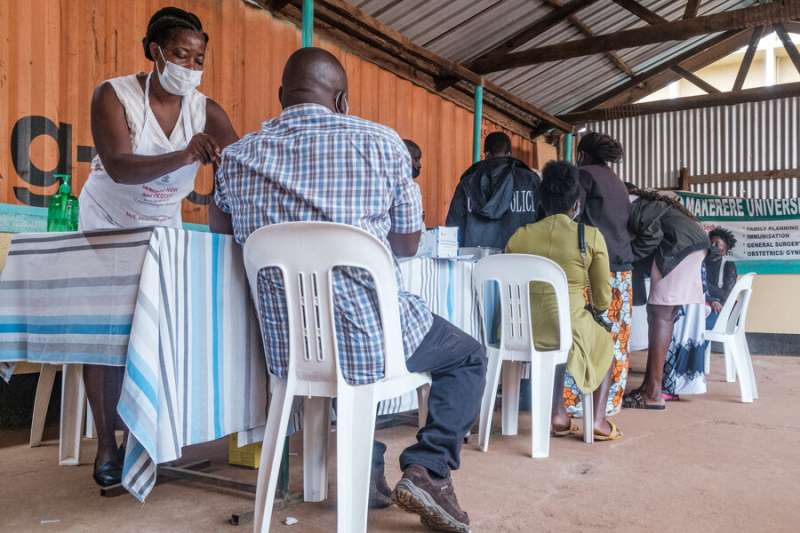This article has been reviewed according to Science X's editorial process and policies. Editors have highlighted the following attributes while ensuring the content's credibility:
fact-checked
peer-reviewed publication
trusted source
proofread
Championing health workers to lead vaccination efforts in Uganda

Uganda reported its first case of COVID-19 on March 21, 2020. Almost a year later, the first batch of vaccines to protect against the spread of the disease arrived in the country.
As people began receiving their injections in the ensuing months, researchers from the MIT Governance Lab (MIT GOV/LAB) and Makerere University's School of Public Health in Uganda wanted to understand what was motivating people to get vaccinated and driving interest in vaccines.
In a mobile phone survey conducted in November 2021, the team found that respondents who received information about COVID-19 from health workers were more likely to be vaccinated. The findings were published March 17 in the journal BMJ Open.
The results show that people trust the health care system, so strong messaging from health officials can play an important role in future vaccination efforts, says Lula Chen, a research scientist at MIT GOV/LAB and a co-author of the study.
"We need to have [health workers] as champions of these vaccines," says Rawlance Ndejjo, assistant lecturer in the Department of Disease Control and Environmental Health at Makerere University and first author of the study.
The recent paper comes out of a larger collaboration between MIT GOV/LAB, Makerere University, University of Kinshasa's School of Public Health in the Democratic Republic of the Congo, University of Ibadan's College of Medicine in Nigeria, and Cheikh Anta Diop University in Senegal. The teams have worked together on phone surveys to develop a better understanding of people's attitudes toward COVID-19 vaccines in Africa and their trust in authorities during the pandemic. Lily L. Tsai, the Ford Professor of Political Science at MIT and MIT GOV/LAB's director and founder, is a co-author of the new paper.
Lack of availability was a greater barrier than hesitancy
Nearly 1,200 adult participants in Uganda completed the phone survey for the new study. Participants were asked whether they were vaccinated against COVID-19, what factors influenced their decision to get vaccinated or not, and if those who were unvaccinated intended to get vaccinated. The survey administrators also collected demographic information such as respondents' age, gender, employment status, education, and where they lived.
At the time of the study, all adults were eligible to receive the vaccine. But people living in rural areas had less access to vaccines, Ndejjo says.
Nearly half (49.7%) of respondents said they had received at least one dose of a COVID-19 vaccine. At around the same time, data from the Ministry of Health indicated that only around 16% of adults had received at least one dose of the vaccine. This discrepancy could be due, in part, to the fact that a mobile phone survey might be more likely to reach people living in urban areas who had more access to vaccines. And some respondents who had not received a vaccine might have reported receiving one.
Encouragingly, around 9 in 10 unvaccinated respondents said they intended to get vaccinated. The most common reasons these respondents gave for why they weren't vaccinated were that vaccines weren't available to them (42% of unvaccinated respondents) or they didn't have time to get vaccinated (24%). Meanwhile, only 13% of unvaccinated respondents said they had safety concerns about the vaccine.
These findings suggest that vaccine hesitancy was not as big of an issue as simply providing enough people with access, Ndejjo says. It shows that health care systems "need to reach people in the most convenient way for them to actually actually get vaccinated," he adds.
People who got information from health workers were more likely to be vaccinated
Respondents also indicated that health workers influenced their decision to get vaccinated. Around 14 percent of vaccinated respondents said a recommendation to get vaccinated from a health worker was one of the reasons they got the shot. Another question asked people to list their sources of information about COVID-19. Responses included family members, friends, television, local leaders, and health workers. People who listed health workers as a source of information were more likely to get vaccinated than those who did not.
At the start of the pandemic, there were issues with vaccine hesitancy among health workers, Ndejjo says. Uganda included health workers as a priority group for vaccines, which Ndejjo thinks was key for increasing vaccination rates in the general population. The move increased vaccination rates among health workers, as well as how much they could share with patients about vaccines.
The finding highlights the importance of educating health workers on vaccines and training them to communicate information about vaccines to patients, Ndejjo adds.
The study also identified that people older than 65, people who had attended high school or received higher education, and people living in the northern and central regions of Uganda were more likely to be vaccinated. The connection between vaccination status and education implied to Ndejjo that "maybe there's a group that we're leaving behind in terms of access to information regarding vaccines." He suggests that communicating information more simply, and using mass media to reach a wider range of people, could help.
Whom people trust for information on vaccines is important, since there was misinformation about COVID-19 vaccines around the world at the time. If health-care systems can build trusting relationships with people, they might be able to increase vaccine uptake, Chen says.
Next, the team wants to apply what they've learned from the COVID-19 vaccine surveys to study interventions to increase vaccination rates for human papillomavirus (HPV) among adolescent girls in Uganda.
More information: Rawlance Ndejjo et al, Uptake of COVID-19 vaccines and associated factors among adults in Uganda: a cross-sectional survey, BMJ Open (2023). DOI: 10.1136/bmjopen-2022-067377
This story is republished courtesy of MIT News (web.mit.edu/newsoffice/), a popular site that covers news about MIT research, innovation and teaching.





















